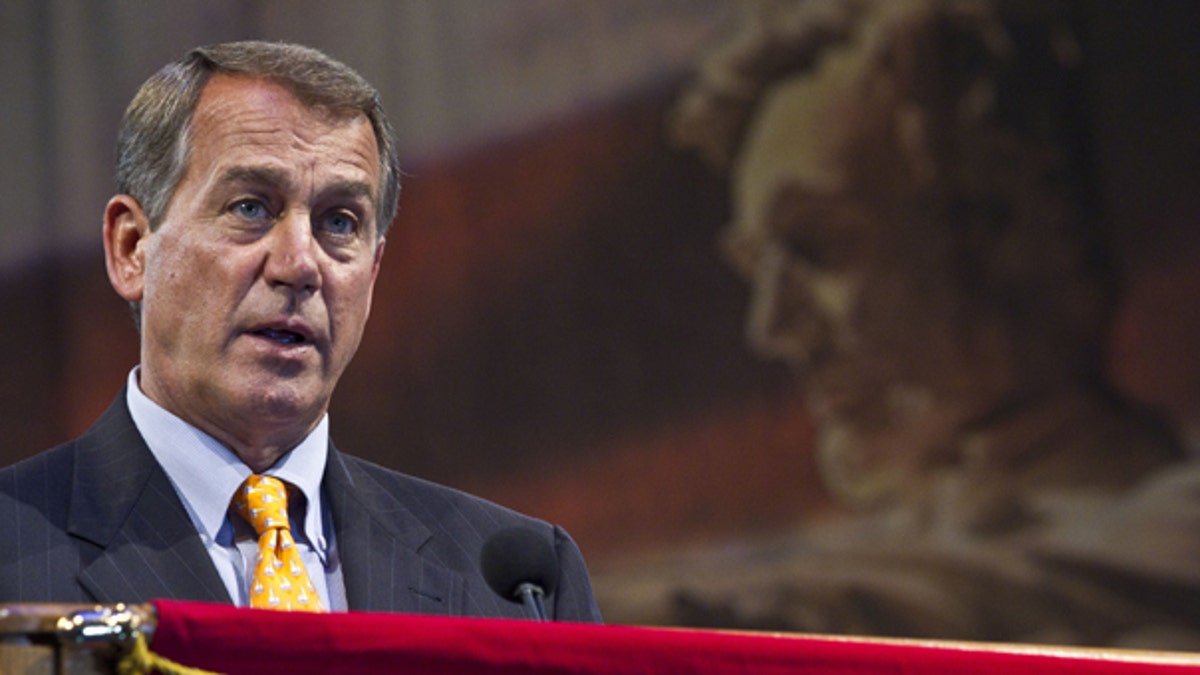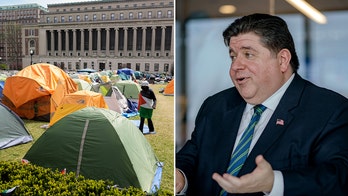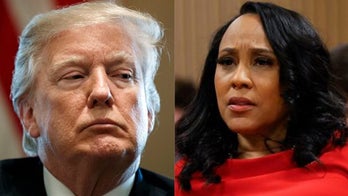
Aug. 31: House Republican leader John Boehner speaks at the American Legion convention in Milwaukee. (AP)
WASHINGTON -- House Republican leader John Boehner said Sunday he would vote to pass middle-class tax cuts without an extension for high-income earners, but only if that's the only way to get an extension of Bush-era tax reductions through Congress.
"If the only option I have is to vote for those at 250 and below, of course I'm going to do that. But I'm going to do everything I can to fight to make sure that we extend the current tax rates for all Americans," Boehner told CBS' "Face the Nation."
But Boehner, R-Ohio, said that along with all the additional spending approved by Democrats, it is "bad policy" to exclude the job-creating tax brackets in an extension of Bush-era cuts.
"When you start to look at who is going to be taxed, about half of all small-business income will be taxed under the president's proposal. These are the very people that we expect to invest in the economy and to begin creating jobs. Why would we want to punish them?" he asked.
With the unemployment rate at 9.6 percent, President Obama's new chairman of the Council of Economic Advisers said high unemployment must be met with tax cuts for the middle class, but the U.S. can't afford an extension of the Bush-era cuts for high-income earners.
"What we cannot afford to do is pass 700 billion additional dollars of tax cuts for the millionaires and billionaires at a time when we are just going to borrow that money," CEA chief Austan Goolsbee told "Fox News Sunday."
Goolsbee, who replaced Christina Romer as the administration's top economic guru, said the middle class shouldn't get squeezed by expiring tax cuts.
"The president strongly believes that ... after a decade of astounding squeeze on the middle class that was followed by the worst recession in our lifetime ... you cannot afford to raise taxes on the middle class. We should make that permanent," Goolsbee said, adding that if Boehner is for that, "I would be happy."
But Boehner said the people who would be denied a tax cut make up about half of small business income.
"Obviously, the top 3 percent have half the gross income of companies we would term small businesses. You don't want to punish these people," Boehner said.
He added that spending should be cut to 2008 levels, which would be a 22 percent reduction.
"If we cut spending, we will help our economy. We will send signals to the markets. We will send signals to the business community that Washington's attempting to get its fiscal house in order," he said. "Let's do the spending bill now and show the American people that we can work together to cut spending and to keep the current tax rates in order."
"John Boehner has correctly proposed -- the Republican leader in the House -- let's go back to Bush's 2008 budget and you can save like -- something like a trillion, 300 billion dollars just by not spending the money," said former House Speaker Newt Gingrich, who led Congress during four years of balanced budgets in the 1990s.
Gingrich, who also appeared on "Fox News Sunday," added that those who complain about going back to the Bush years should recall that unemployment was a lot lower and "the middle class was much better off."
But Obama senior adviser David Axelrod said that the Republicans want to return to an agenda that had the middle class "treading water" and resulted in 4 million job losses in the last six months of the Bush administration and 8 million job losses overall since the recession began at the end of 2007.
"That agenda was a disaster. That agenda turned the Clinton surplus into a record deficit of $1.3 trillion, gave free rein to special interest and led to the biggest -- at the expense of the middle class of the economy -- and led to the greatest economic collapse since the Great Depression. Why would we want to go back to that?" he asked on NBC's "Meet the Press."
Goolsbee said that the small business tax bill in the Senate this week would help 4 million "real" small businesses, not just lawyers and lobbyists who use tax loopholes to avoid corporate income. But "cutting taxes for very high income people an average of more than $100,000 a year for people that make more than a million dollars a year is not an effective way to get the economy going."
When Democrats and Republicans do meet this week, likely maneuvers will include getting the other side to cast votes on amendments that would read badly to voters. Already, the Democratic National Committee plans to air ads beginning Tuesday that portray Boehner, who would likely become House speaker if Republicans win a majority, as a friend of the wealthy at the expense of teachers, police officers and firefighters.
"Boehner has a different plan," says the ad's narrator. "Tax cuts for businesses and those that shift jobs and profits overseas. Saving multinational corporations $10 billion."




